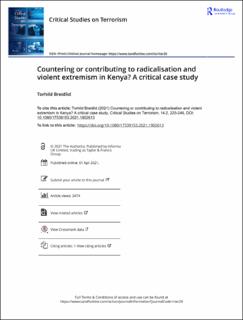Countering or contributing to radicalisation and violent extremism in Kenya? A critical case study
Peer reviewed, Journal article
Published version
Permanent lenke
https://hdl.handle.net/11250/3003888Utgivelsesdato
2021-07-01Metadata
Vis full innførselSamlinger
Originalversjon
Critical Studies on Terrorism. 2021, 14 (2), 225-246. https://doi.org/10.1080/17539153.2021.1902613Sammendrag
In this article, I argue that the “theological and social-psychological radicalisation model”, which has been primarily used in a Western context, has influenced the strategies used by the Kenyan government to explain and combat radicalisation and terrorism. The model predominantly focuses on religion and social networks as crucial to the radicalisation process. My research in Kenya demonstrates how the underlying principles of the model are used in a non-Western context. I claim that the Kenyan government is increasingly using the model to delegate surveillance, especially to the security sector but also to some civil society actors. As illustrated in my findings, Kenya has, through specific definitions, reports and statements, contributed to the institutionalisation of the term radicalisation and its link to Islam. My argument is substantiated by an analysis of official policy documents, official statements and interviews. Paradoxically, the hard approach taken by the security sector in Kenya towards the Muslim population seems to have further fuelled radicalisation in the country.

